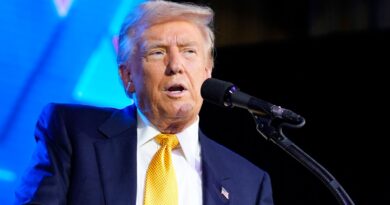Trump Suggests Replacing Income Tax with Broad Tariffs on Rogan Podcast
‘Yeah, sure. But why not?’ Trump told podcast host Joe Rogan.
In his Oct. 25 appearance on “The Joe Rogan Experience” podcast, former President Donald Trump floated the idea of eliminating the income tax and substituting it with sweeping tariffs.
Host Joe Rogan asked if the Republican presidential candidate had made the suggestion, as earlier reports had indicated.
“Yeah, sure. But why not?” Trump replied.
“We will not allow the enemy to come in and take our jobs and take our factories and take our workers and take our families unless they pay a big price. And the big price is tariffs.”
He referenced President William McKinley, who served from 1897 until his assassination in 1901, as “the tariff king.”
“He spoke beautifully of tariffs,” Trump said.
McKinley was often nicknamed the “Napoleon of Protection” for his aggressive defense of high tariffs in the House of Representatives.
“And then, in the early 1900s, they switched over—stupidly, frankly—to an income tax. And you know why? Because countries were putting a lot of pressure on America: ‘We don’t want to pay tariffs, please don’t.’ You know they, believe me, they control our politicians.”
Heading into the November election, Trump has proposed implementing a 10 percent universal across-the-board tariff and up to 60 percent levies on all China-made imports. His staunch pursuit of higher import taxes is to facilitate the onshoring and reshoring of American manufacturing and protect jobs for U.S. workers, he said.
However, Trump said, businesses that do not ship jobs overseas and maintain their operations within the nation’s borders would not be subjected to tariffs and instead, receive a lower corporate tax rate.
Tariffs Versus Income Taxes
Until the federal government instituted an income tax in 1913, tariffs had been the primary source of revenue, accounting for as much as 95 percent of all receipts at times. Over the decades, tariff revenues have made up a smaller share of what the United States receives.
The U.S. government would need to raise tariffs by around 60 percent to fill the more than $2 trillion gaping hole in the federal budget that would appear if the income tax were erased.

Shipping containers, some marked “China Shipping,” are stacked at the Port of Los Angeles, Calif., on Nov. 7, 2019. Mario Tama/Getty Images
Additionally, PIIE economists say that “it is literally impossible for tariffs to fully replace income taxes” because rates would need to be much higher to garner as much revenue.
Billionaire Howard Lutnick, a Wall Street executive at the helm of Trump’s transition operation, has resisted some criticisms. He recently described tariffs as merely a negotiation tactic and a “bargaining chip” that the former president could use to promote American industry and products and defend workers.
“Use tariffs to build in America,” he added. “We need to protect the American worker.”
Vice President Kamala Harris opposes Trump’s plan to raise tariffs on China and has refrained from commenting on the current administration’s continuation of Trump-era tariffs on Chinese goods.





